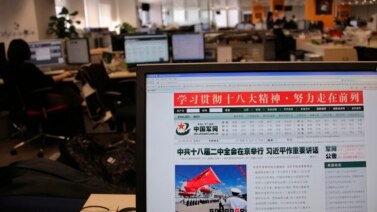
The United States is calling on China to release a group of religious leaders and lawyer Zhang Kai. China has accused them of threatening public order and national security. The appeals come just days before Chinese President Xi Jinping’s first state visit to Washington.
China detained lawyer Zhang Kai and the religious leaders on August 25. David Saperstein is the U.S. ambassador-at-large for religious freedom. The U.S. ambassador called their detention a “particularly alarming development.” It came as he prepared to meet with Chinese officials to discuss religious freedom.
“There can be no excuse for the detention of these religious figures that either met with me or tried to meet with me.” He added, “These detentions fit into a disturbing pattern of state intimidation of public interest lawyers, Internet activists, journalists, (and) religious leaders.”
U.S. State Department official Mark Toner said on Tuesday that religious freedom is something the United States watches closely.
"I can say that it is an ongoing concern. Specifically, just to cite a recent case, prominent Christian human rights lawyer Zhang Kai and his assistant, they were detained by the Chinese authorities. We certainly want to see him released, but this is just indicative of an ongoing pattern that we’ve seen."
Zhang Kai has been advising Christian leaders who are resisting orders to remove crosses from the top of church buildings.
Maya Wang is a researcher with Human Rights Watch in Hong Kong. She says Zhang Kai has defended human rights in China for many years.
"He is primarily known for his work defending Christians and also Falun Gong practitioners. And this time it appears that he was very much involved in advocating for the Christians in Zhejiang whose crosses have been forcibly taken down by the government."
The researcher says there have been greater restrictions on civil liberties in China over the past two years. She wants U.S. officials to raise the issue of human rights defenders privately and publicly with Chinese officials during Mr. Xi’s state visit.
Wednesday, the “China Daily” newspaper published comments from the Chinese Ambassador to the U.S., Cui Tiankai. He wrote that the two countries are benefiting from growing cooperation. He said that even with their differences, including disputes in the South China Sea, cooperation is the best way to find solutions. He said the two sides should not let such differences direct relations.
US Ambassador called for release of women prisoners
Samantha Power is the U.S. Ambassador to the U.N. On Tuesday, she attended the 20th anniversary of an international conference on sexual equality and women’s rights in Beijing. Ambassador Powers launched a separate campaign to publicize the detention of 20 women political prisoners in China.
Ambassador Power says the name of one of the women will be released each weekday leading up to a conference at the U.N.’s headquarters in New York. The first one is Wang Yu.
"For her work, Wang has been harassed, threatened and smeared in the state-run media. On July 9, 2015, Wang herself was detained. So was her husband along with their 16-year old son. Wang and her husband remain in prison, where they have been denied regular access to a lawyer in custody and have not yet been charged."
I’m Jonathan Evans.
VOA’s Victor Beattie reported on this story. George Grow adapted his report for Learning English. Hai Do was the editor.
Words in This Story
alarming – adj. very concerning
figures – n. people or individuals
disturbing – adj. causing concern or worry
intimidation – n. the action of threatening someone
ongoing – adj. continuing or in progress
certainly – adj. surely; without question
cross – n. an object or marker in the shape of the letter “T”; in Christianity, it represents the object on which Jesus Chris was executed
practitioners – n. followers or believers
advocating – adj. done in support of something
codes – n. rules
previously – adj. former; something done before or in the past
sanctioned – v. receiving official permission or approval
benefiting – v. getting a profit or gain from something
smeared – v. damaging the image by making false accusations
access – n. a way to get near or use of something
custody – n. in detention

